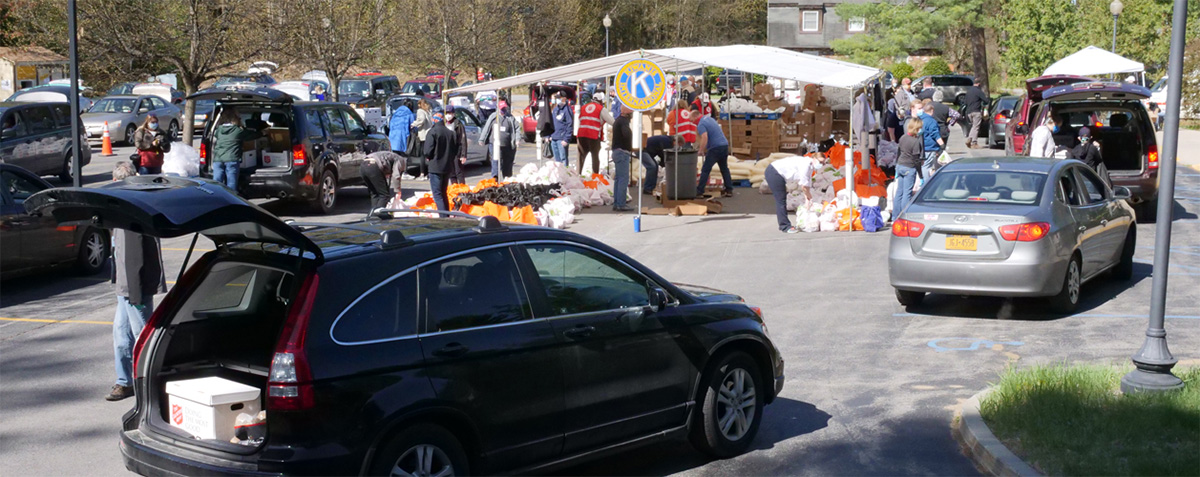Closing The Financial Gap

by Robert Mitchell
The Saratoga Race Course draws 1 million horseracing fans each summer to the idyllic city of Saratoga Springs in upstate New York.
Spectators are typically greeted by a large Salvation Army kettle, which generates $75,000 a year for the local corps to help marginalized people who live in the shadows of the glitzy vacation spot.
This summer, that familiar scenario will change. While the horse races will go on, they will do so without spectators due to COVID-19. The move leaves the Saratoga Springs Corps scrambling for funding.
"We’re talking to a variety of different people and supporters of Saratoga Springs to see if they’d be willing to cover some of that kettle," said Sarah Miller-Locke, director of advancement for the Empire State Division.
"We’ve been talking about this and strategizing, and we have some key funders in place. We’re just in the early stages of implementing and seeing how it’s going to unfold now that we know definitively that the racetrack is not going to have people."
Lieutenant Bree Barker said she and Lieutenant Trisha Smouse, the corps officers in Saratoga Springs, are reaching out to local businesses, but funds are tight.
"The difficult thing in this area is that everybody needs funding," Barker said. "We’re asking banks and other places to help us fill that gap."
Further complicating things is that the Saratoga Performing Arts Center (SPAC), a huge economic engine for the area, is running a campaign to close a more than $1-million shortfall due to COVID-19. The competition for donations is fierce.
Barker said the $75,000 from the racetrack kettle normally helps fund year-round programs such as a breakfast feeding, after-school activities, staff, utilities, and more.
The corps also operates a motel outreach, which Barker said "exploded" during COVID-19 when 4,000 people a month received food boxes.
"Ninety-nine percent were delivered to doorsteps around the county," she said.
Barker said while food assistance was a huge necessity early on in the pandemic, she anticipates the needs will change to requests for mortgage, rent, and utility assistance.
"The funding will be used for all of those emergency financial needs," she said. "We’ve had a lot of requests for fixing cars and making car payments so people can get to work once work is back open; lots of things like that. We’re seeing that there’s going to be new kinds of requests so we’re working with headquarters to be as flexible as possible on what we can provide payment for that we weren’t able to in the past."
Despite the challenges, Barker is optimistic.
"I do have faith that God is going to provide for us and we’re going to be OK," she said. "I just don’t know exactly where that’s going to come from."
Standing ready in Corning, N.Y.
A little further west in the Empire State Division, the Corning, N.Y., Corps has embarked on a "Fill the Gap" fundraiser that runs through July. The goal is $25,000.
The Corning Corps is home to the popular Kid’s Café after-school and summer day camp program, which closed in March due to COVID-19.
"The energy now is to find the funds to be able to reopen the program once school is up and running under the new safety and licensing standards," said Linda Wright, the Empire State Division’s director of social services.
Mary Ellen Monahan, director of the Kids Café and an advisory board member in Corning, said she hopes the program can reopen this fall.
"What we’re doing is waiting to see what school will look like in the fall and we want to be able to support that," she said.
If students are still at home in the fall, Monahan said the corps would "look to do some sort of virtual support with them." The corps is also looking into extended or flexible hours if schools are on any kind of alternate schedule.
Monaghan said as more businesses reopen and call back workers, the corps stands ready to help working parents returning to their jobs. Many of them were furloughed or laid off during COVID-19 and may need help with things like rent and mortgage payments, utilities, food, and childcare.
"It has been quite an ordeal for a lot of families, and this is a time that we really want to be able to step up and help families," she said.
Wright agreed.
"There were large numbers of people who were laid off in the Corning area," she said. "So, we know those folks will need some help until they can get their feet back under them and stabilized."
